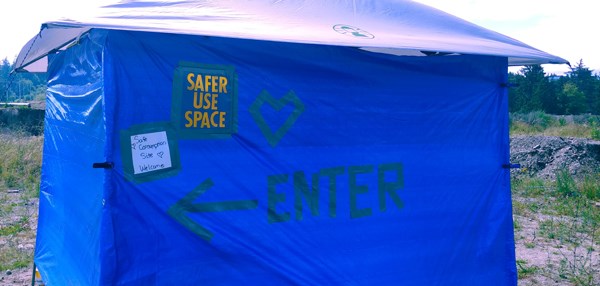Local governments on the Sunshine Coast are working through the possibilities for one or more safe drug consumption sites on the Coast – or even a mobile unit – after a group of substance users set up an ad hoc site in Sechelt.
The issue was added at the last minute to last week’s meeting agendas for councils in Sechelt and Gibsons and the Sunshine Coast Regional District (SCRD) board.
Local governments were also copied on a June 23 letter from medical health officer Geoff McKee of Vancouver Coastal Health (VCH) outlining “some considerations for overdose prevention services on the Sunshine Coast.”
McKee’s letter encouraged local governments to keep working with the Sunshine Coast Community Action Team (CAT) “to develop a localized approach” to the issue.
McKee told councillors in Sechelt June 24 that CAT is “an excellent platform for the collaboration we need to really get successful initiatives going,” noting the group was instrumental in getting a safe consumption site established in Powell River.
Hawkfeather Peterson, one of the people behind the unsanctioned overdose prevention site in Sechelt, told councillors in Gibsons later that same day that while the CAT has been holding preliminary discussions about a site, deaths linked to a tainted drug supply continue and they felt something needed to be done to get the attention of local governments.
“While it looks like a revolutionary or disruptive act to put up an unsanctioned site, historically that’s been how a lot of the sanctioned sites have come about… Peers will set up an unsanctioned site and that will be what spearheads a sanctioned site being created in a community, especially in a community where we’re being told by our health authority that there’s no funding available.”
Both councils were generally sympathetic to the problem, and the urgency, but were not ready to commit to any specific plan.
Sechelt Coun. Brenda Rowe, a nurse at Sechelt Hospital, said, “Let me tell you, you only have to be in the emergency room when one of these overdoses come in and you see it in action and the trauma that it causes not just to the family, but to everybody involved. You want to do whatever you can to not have that experience.”
Sechelt Mayor Darnelda Siegers, who is also council’s liaison to the CAT, said events have moved quickly and overtaken the work that was already underway.
“At the beginning of this year we actually had a plan in place to do those community engagements [on a safe consumption site], to start doing that education and everything else … and then COVID hit. All of that got cancelled and the COVID piece has actually made it worse for the people who do drugs,” Siegers said.
She said it’s now apparent that a site will be set up somewhere, with or without district or VCH participation, and “if we want to have any say in where it goes in our community, it will be up to us to identify a spot that we could support.”
Sechelt council voted to ask for a staff report on where an overdose prevention site could be located and what the ramifications would be.
In Gibsons, council passed a motion to have the Town’s chief administrative officer work with his counterparts in Sechelt and at the SCRD to “identify the implications and potential sites and opportunities to work with the peers and Vancouver Coastal Health.”
Gibsons Mayor Bill Beamish said the goal should be to have a “sanctioned site, properly done.”
SCRD directors voted at a June 25 committee meeting to refer the letter to staff to work with other local governments and report back “as appropriate.”
The possibility of a mobile facility was also raised – in Gibsons, Sechelt and by SCRD directors. Peterson said that’s also the preferred solution for many of the likely clients.
At the SCRD meeting, Halfmoon Bay director and chair Lori Pratt said a mobile facility in Kelowna operates at two locations. “It seems to be working really well, so I think that’s something definitely to look into,” she said.
Speaking in Gibsons, Peterson said the ideal location or locations would be “a delicate balance of having it obvious to substance users and accessible to substance users without flying in the face of a community that might oppose it.”
Coun. David Croal acknowledged that there could be some opposition.
“Yes, it’s probably a hard pill for the community to swallow,” he said. “But I think it’s something that’s critically important because we’re dealing with a problem that’s not improving.”
Sechelt Coun. Alton Toth said some sort of broader consultation will be needed.
“There’s going to be a lot of fear, there’s going to be a lot of NIMBYism about it, but I think the community associations at a minimum need to have some input,” said Toth, adding that given the likely locations would be downtown, the SDBA should also be consulted.
In his letter, McKee said the provincial health emergency on opioids declared more than a year ago allows VCH to designate a site without going through the federal approvals needed for a permanent site like InSite in Vancouver.
At the SCRD meeting, Elphinstone director Donna McMahon noted a distinct approach would be needed in rural areas. “This is often seen as an urban problem,” said McMahon, “but in my area, it’s sort of like genteel addiction. Everybody is using at home. And there’s a great deal more out there than people realize. So an outreach strategy to that population is kind of a different strategy.”
She also identified a lack of data about the scope of the problem on the Sunshine Coast, likening the situation to VCH’s reluctance to publish COVID-19 cases. “It’s very helpful for the community to know that this is a real problem and it’s not just people that you may see on the street corner. This is your neighbours.”



